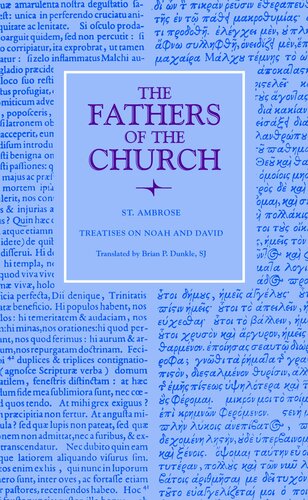

Most ebook files are in PDF format, so you can easily read them using various software such as Foxit Reader or directly on the Google Chrome browser.
Some ebook files are released by publishers in other formats such as .awz, .mobi, .epub, .fb2, etc. You may need to install specific software to read these formats on mobile/PC, such as Calibre.
Please read the tutorial at this link: https://ebookbell.com/faq
We offer FREE conversion to the popular formats you request; however, this may take some time. Therefore, right after payment, please email us, and we will try to provide the service as quickly as possible.
For some exceptional file formats or broken links (if any), please refrain from opening any disputes. Instead, email us first, and we will try to assist within a maximum of 6 hours.
EbookBell Team

4.8
104 reviewsThese sermons by Ambrose of Milan (340–397 AD) provide a window into the preaching and scriptural exegesis of the legendary bishop, whose exposition of the Old Testament was instrumental in the conversion of Augustine of Hippo and in the development of Latin theology. In his treatise On Noah and his two Defenses for David, Ambrose borrows from influential Greek theologians, including Philo of Alexandria, Origen, and Didymus the Blind, while developing his own commentary on the exemplary patriarchs. Ambrose's exegesis typifies both his attention to the letter of Scripture as well as his spiritual and allegorical reading of the holy figures or "saints" who lived before Christ.
The first treatise presents Noah as a model just man, as Ambrose pairs the literal and the higher or spiritual meaning of the Genesis flood narrative to address topics ranging from the Genesis narrative to Stoic ethics to the Incarnation. In his defense of David to the emperor Theodosius, Ambrose ties David's sin and repentance to his own close reading of Psalm 51(50), David's plea for himself in his famous "Miserere." While the authenticity of the third treatise included in the volume, the Second Apology of David, has long been challenged, recent scholarship suggests that it transmits Ambrose's own preaching, which applies the lessons of David's life to the situation of gentile unbelievers, Jews, and the church; even if it is the work of
a later imitator, the Second Apology is a compelling and systematic treatment of the David's sin and repentance as relevant to Christian morality and doctrine.
The three treatises, previously unavailable in English translation, broaden our understanding of exegesis in the Latin West and our interpretation of Ambrose as preacher and exegete.